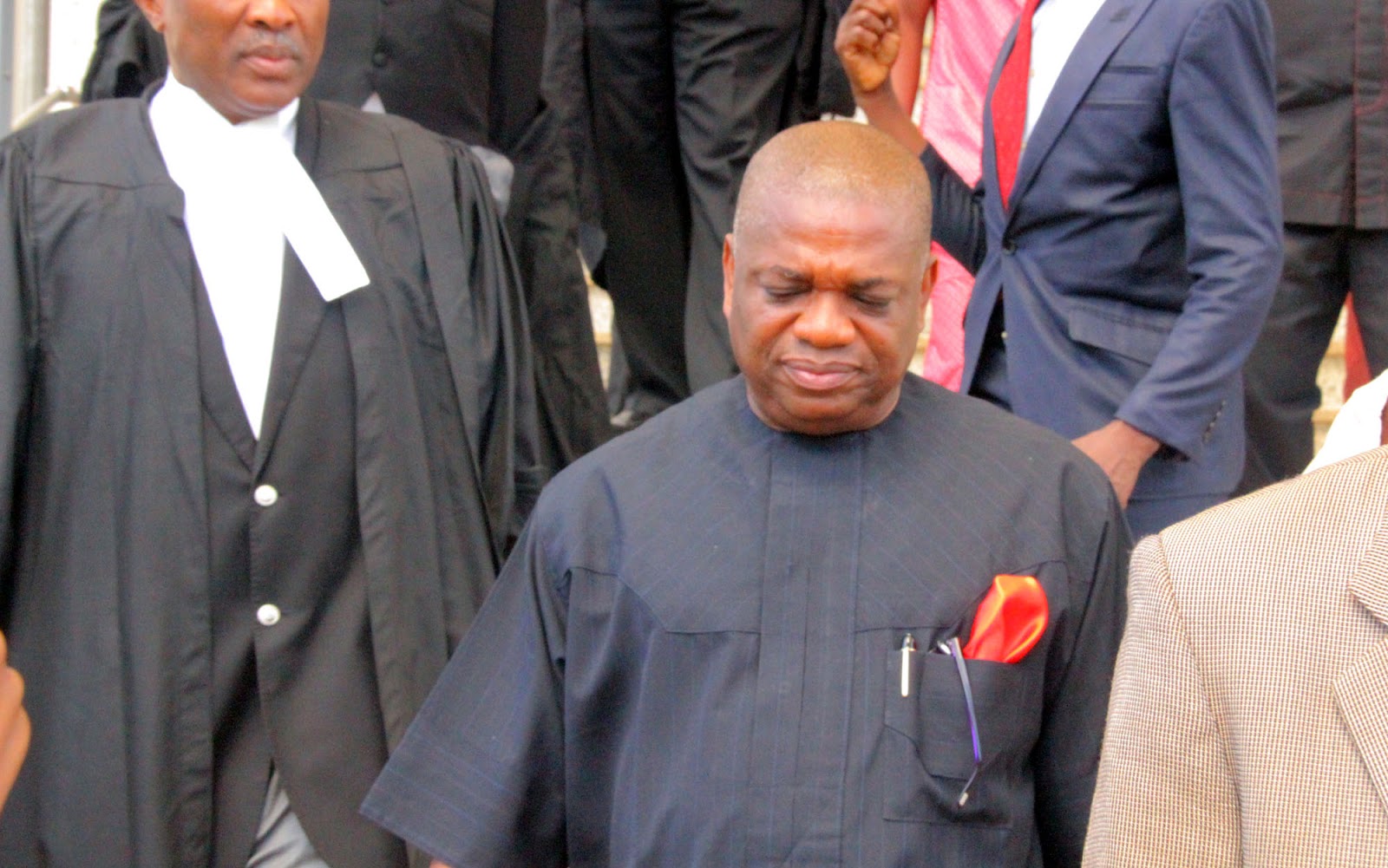Ladipo Sanusi|
Lawyers to the former governor of Abia State, Dr. Orji Uzor Kalu, and two others, have failed to stop a witness summoned by the Economic and Financial Crimes Commission (EFCC), from giving evidence in their clients’ trial.
Justice Mohammed Idris of a Federal High Court, in Lagos, today rejected the objection raised by the lawyers yesterday.
Kalu alongside his former aide, Udeh Udeogu, and his company, Slok Nigeria Limited, are standing trial before the court on an amended 34-count charge of alleged N3.2billion fraud.
At the hearing of the matter on Monday, the EFCC through its prosecutor, Mr. Rotimi Jacobs (SAN) had called his witness, Mr. Onovie Oghenevo, a banker, to give evidence in their trial.
However, lawyers to Kalu and other defendants including Mike Ozekhome, Goddy Uche Kalu, C. A. Uwelunta, and Solo Akumah, all Senior Advocates of Nigeria (SANs), had objected to the witness giving evidence in the trial, on the ground that his statement is not attached to the Proof-of-Evidence, despite being listed as Number 12 witness in the matter.
The lawyers had argued that the EFCC’s action was not in conformity with Section 36(6) of the 1999 Constitution, and Section 379(1) of Administration of Criminal Justice Act (ACJA), which made it mandatory and fundamental for the prosecution to furnish the defence with all materials needed to defend themselves.
Consequently, the lawyers urged the court to disqualify the witness from giving evidence in the trial.
Jacobs, in response, while urging the court to allow his witness to give evidence in the trial, told the Court that the witness is a signatory to some of the documents to be tendered in the trial.
He further informed the Court that the witness is a witness of the Court, because he was subpoenaed by the Court.
He added that by Provision of Section 241 of Administration of Criminal Justice Act (ACJA), the prosecution is at liberty to apply to the Court for issuance of Subpoena on a witness to bring with him the documents he has for his evidence and that the witness is effectively witness of the Court, not of the prosecution.
Delivering ruling on the submission of both parties on Tuesday, Justice Idris said there was no dispute that the witness was listed, and what he was to tender were in the Proof-of-Evidence, except his statement.
The Judge stated that if the witness did not make any statement to the police, such statement cannot be attached to the Proof-of-Evidence.
The Judge also agreed with the prosecution on the witness who was subpoenaed by the Court, saying that the role of the Court is to assist the presence of a witness in court.
The Judge also stated that the charge was filed before the introduction of Section 397(1) (a) of ACJA.
Consequently, Justice Idris ruled that the prosecution witness is competent to give evidence in the trial of the defendants.
Upon deciding the ability of the witness to give evidence in the trial of the former governor and two others, their lawyers again raised objection to the admissibility of the bundles of documents attached with a letter dated October 13, 2006, which was tendered by the witness.
The defence lawyers stated that though they were not objecting to the admissibility of the letter from which was co-signed by the witness, they were vehemently objecting to the attached documents, which was signed by one M. A. Udoh.
They also based their objection on the certification of the bundles of documents, which they claimed was done by the EFCC.
Ozekhome particularly argued that EFCC cannot certify documents that did not emanate from it. He added that the documents were only certified on Monday after the court proceedings.
He stated that by section 83(1) (B) and 104(1) of the Evidence Act, the EFCC did not tell the court why the bank itself did not certify the documents.
He said, “It is only the custodian of a document that has possession of such and can legally certify it not another party that wants to use it.”
Jacobs in his response said once there was no opposition to the admissibility of the letter carrying the bundles of documents, the entire documents should be admitted by the Court.
He said, “Having not objected to the document itself, they have allowed other documents to be admitted.
“What was certified was a letter written to the EFCC and the attachment. The certification complied with Section 104 of the Evidence Act.”
He urged the Court to admit the letter and the attached documents.
Justice Idris adjourned till tomorrow to rule on the admissibility of the letter and attached documents, as well as continuation of trial of the defendants.
0






